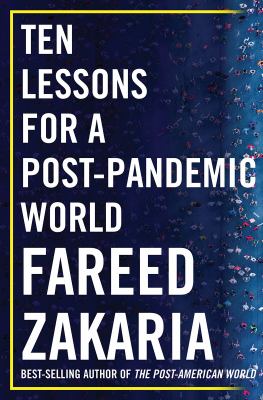
by Fareed Zakaria
Publishers Weekly In this scattershot treatise, CNN host Zakaria (The Post-American World) gleans lessons from the Covid-19 outbreak on how society, politics, and international relations could and should evolve. In the book’s strongest sections, Zakaria argues that America needs a less fragmented and gridlocked government bureaucracy to cope with health threats, and he calls for more honesty and empathy from scientists, and foresees accelerated migration of work and life onto the internet. Other points seem tangential to the virus (the rise of robots and artificial intelligence to displace humans), or rehash Zakaria’s already well-articulated stances (he spends many pages defending globalization and multilateralism against Trumpian nationalism). He anthropomorphizes Covid-19 as “nature’s revenge” for overpopulation and human environmental encroachments, and suggests that “promoting healthier diets” will help to prevent the next pandemic. Zakaria also disparages America’s Covid-19 response by cherry-picking the statistic that by July 2020 “per-capita daily death rates in the United States were ten times higher than in Europe,” without noting that the continent’s outbreak peaked earlier, with similarly high death rates in multiple countries. This less-than-cogent analysis of the coronavirus pandemic leaves much to be desired. (Oct.) (c) Copyright PWxyz, LLC. All rights reserved Kirkus The CNN host and bestselling author delivers a pithy roundup of some of the inevitable global changes that will follow the current pandemic. Examining issues both obvious and subtler, Zakaria sets out how and why the world has changed forever. The speed with which the Covid-19 virus spread around the world was shocking, and the fallout has been staggering. In fact, writes the author, “it may well turn out that this viral speck will cause the greatest economic, political, and social damage to humankind since World War II.” The U.S., in particular, was exposed as woefully unprepared, as government leadership failed to deliver a clear, practical message, and the nation’s vaunted medical institutions were caught flat-footed: "Before the pandemic…Americans might have taken solace in the country’s great research facilities or the huge amounts of money spent on health care, while forgetting about the waste, complexity and deeply unequal access that mark it as well." While American leaders wasted months denying the seriousness of Covid-19 and ignoring the advice of medical experts, other countries—e.g., South Korea, New Zealand, and Taiwan—acted swiftly and decisively, underscoring one of the author's main themes and second lesson: "What matters is not the quantity of government but the quality.” Discussing how “markets are not enough,” the author astutely shoots down the myth that throwing money at the problem can fix the situation; as such, he predicts a swing toward more socialist-friendly policies. Zakaria also delves into the significance of the digital economy, the resilience of cities (see the success of Hong Kong, Singapore, and Taipei in suppressing the virus), the deepening of economic inequality around the world, how the pandemic has exacerbated the rift between China and the U.S. (and will continue to do so), and why “people should listen to the experts—and experts should listen to the people." A cleareyed, concise look at current and future affairs offering pertinent points to reflect and debate. Copyright © Kirkus Reviews, used with permission. Copyright © Kirkus Reviews, used with permission. Kirkus The CNN host and bestselling author delivers a pithy roundup of some of the inevitable global changes that will follow the current pandemic. Examining issues both obvious and subtler, Zakaria sets out how and why the world has changed forever. The speed with which the Covid-19 virus spread around the world was shocking, and the fallout has been staggering. In fact, writes the author, it may well turn out that this viral speck will cause the greatest economic, political, and social damage to humankind since World War II. The U.S., in particular, was exposed as woefully unprepared, as government leadership failed to deliver a clear, practical message, and the nations vaunted medical institutions were caught flat-footed: "Before the pandemicAmericans might have taken solace in the countrys great research facilities or the huge amounts of money spent on health care, while forgetting about the waste, complexity and deeply unequal access that mark it as well." While American leaders wasted months denying the seriousness of Covid-19 and ignoring the advice of medical experts, other countriese.g., South Korea, New Zealand, and Taiwanacted swiftly and decisively, underscoring one of the author's main themes and second lesson: "What matters is not the quantity of government but the quality. Discussing how markets are not enough, the author astutely shoots down the myth that throwing money at the problem can fix the situation; as such, he predicts a swing toward more socialist-friendly policies. Zakaria also delves into the significance of the digital economy, the resilience of cities (see the success of Hong Kong, Singapore, and Taipei in suppressing the virus), the deepening of economic inequality around the world, how the pandemic has exacerbated the rift between China and the U.S. (and will continue to do so), and why people should listen to the expertsand experts should listen to the people." A cleareyed, concise look at current and future affairs offering pertinent points to reflect and debate. Copyright Kirkus Reviews, used with permission. Copyright © Kirkus Reviews, used with permission. |